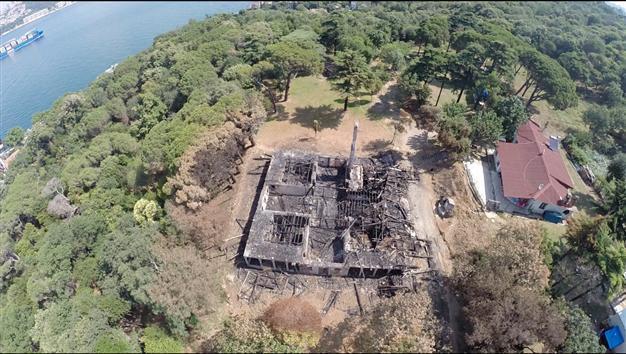Cause of fire that destroyed Ottoman mansion on Bosphorus remains unknown
ISTANBUL

DHA Photo
A fire department report has been unable to determine the cause of the fire that destroyed the Hüseyin Avni Paşa Mansion in Istanbul, raising concerns of a possible arson attack.The Ottoman mansion, located in the Üsküdar neighborhood on the Asian side of the city, was completely destroyed by flames on the afternoon of June 28.
The final report, which was completed by the Istanbul Municipality Fire Department on the Anatolian side three days after the fire, was unable to determine the cause of the fire, as no concrete evidence for the blaze could be found, according to daily BirGün.
“[During our analysis of the incident] we discovered there were no electrical connections in the abandoned mansion … the exact reason of the fire cannot be determined, as no [concrete] factor as to what could have caused the blaze has been found,” the fire department’s report said.
The fire was brought under control within 45 minutes, following the arrival of the firefighters to the scene. Due to the roof collapsing from the fire and covering the second floor, the teams worked to extinguish the fire from the outside of the building, the report said.
The mansion, which belongs to Cengiz Holding, was not insured. Cengiz Construction applied to restore the vacant mansion last year and authorities issued permission just five days ago, a statement released by the corporation said following the fire. “Cengiz Construction will rebuild the Hüseyin Avni Paşa Mansion to its original form,” the corporation stated.
Mehmet Cengiz, who owns Cengiz Construction, had bought 65 percent of the property from Turkey’s state-run Savings Deposit Insurance Fund (TMSF) for 31.7 million Turkish Liras in 2007. He bought the remaining 35 percent of the 81,511 square-meter plot from Erdem Holding for 20.8 million liras in 2009.
In March, the Istanbul Metropolitan Municipality denied reports that the grove had been sold to constructors following its purchase, while Cengiz Construction announced that the land had a “frontal view” of the Bosphorus, meaning the building would be protected under law. Cengiz Construction stated they had made no attempt, nor filed any requests to develop the area.
On Jan. 13, a court lifted an asset freeze that had been applied on seven prominent businessmen, including Mehmet Cengiz, who was implicated in the Dec. 17, 2013 graft probe.
Hüseyin Avni Paşa, who gave his name to the grove, was a 19th century Ottoman statesmen who served as a civil servant and military officer in modern-day Bulgaria and Greece before his appointment as Ottoman chief of staff. He was murdered in June 1876, shortly after leading a coup d’état.
















